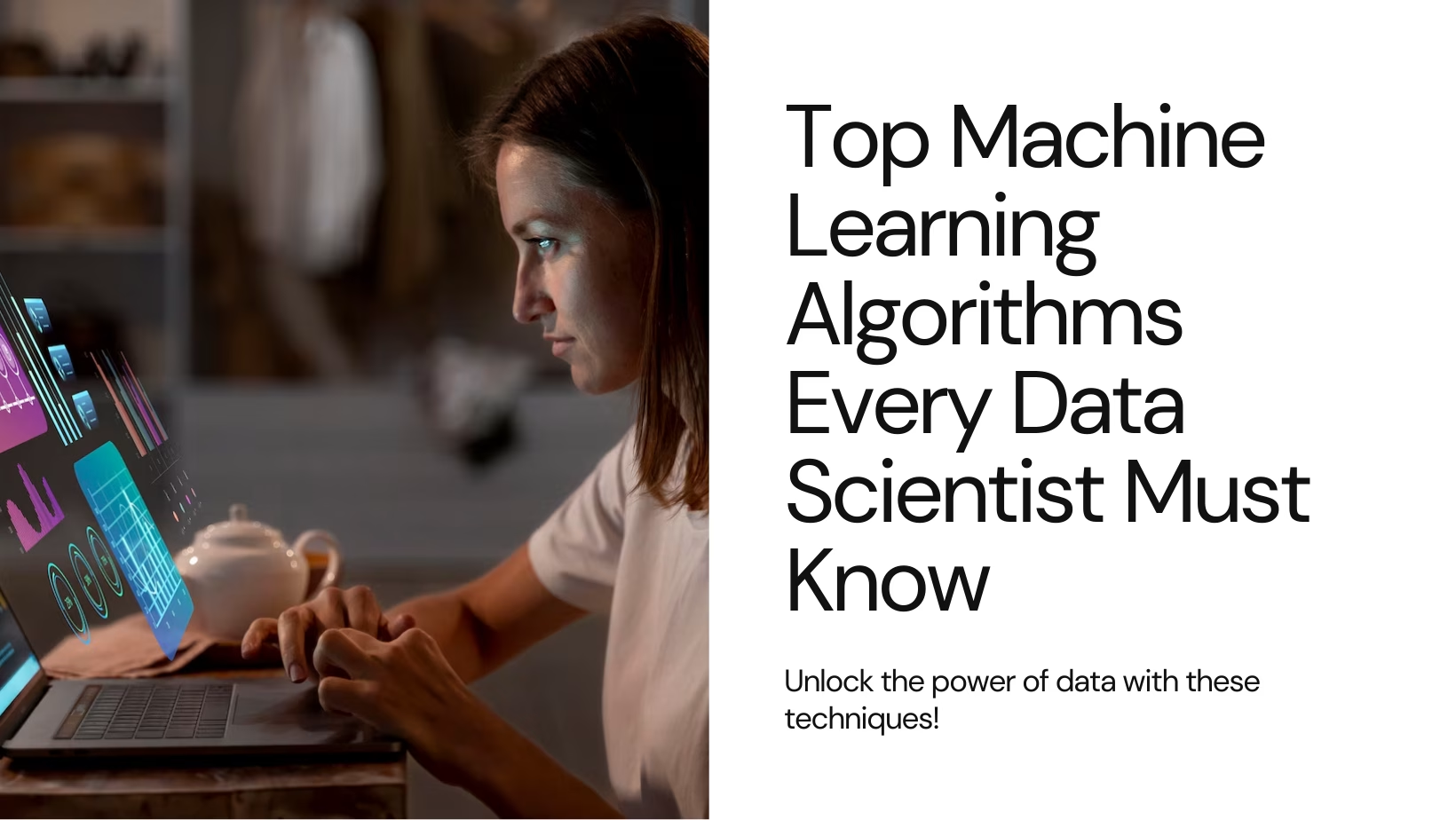Top Machine Learning Algorithms Every Data Scientist Should Know

Machine Learning (ML) is at the heart of modern Data Science, powering applications in healthcare, finance, e-commerce, and artificial intelligence. Understanding the fundamental ML algorithms is crucial for any aspiring Data Scientist.
This guide explores the top Machine Learning algorithms every Data Scientist should master, covering their working principles, applications, and real-world use cases. Plus, we’ll introduce you to expert-led Machine Learning courses at EdCroma to help you gain hands-on experience.
1. Linear Regression
What It Does:
Linear Regression is a supervised learning algorithm used for predicting continuous values based on input features. It finds the best-fit line that minimizes the error between predicted and actual values.
Mathematical Formula:
Y=mX+bY = mX + bY=mX+b
where m is the slope, X is the input variable, and b is the intercept.
Applications:
✅ House price prediction
✅ Sales forecasting
✅ Customer lifetime value estimation
🔥 Learn Linear Regression at EdCroma with real-world datasets!
2. Logistic Regression
What It Does:
Despite its name, Logistic Regression is used for classification problems rather than regression. It predicts the probability of an outcome using the sigmoid function:
P(Y=1)=11+e−zP(Y=1) = \frac{1}{1 + e^{-z}}P(Y=1)=1+e−z1
where z is a linear combination of input features.
Applications:
✅ Email spam detection
✅ Customer churn prediction
✅ Fraud detection
🚀 EdCroma’s Machine Learning courses cover Logistic Regression with hands-on projects.
3. Decision Trees
What It Does:
Decision Trees work by splitting data into branches based on feature values. It follows an if-else logic to make predictions.
Advantages:
✔️ Easy to interpret
✔️ Handles both numerical and categorical data
✔️ No need for feature scaling
Applications:
✅ Loan approval systems
✅ Medical diagnosis
✅ Customer segmentation
🌳 Learn Decision Trees at EdCroma and apply them to real-world business problems!
4. Random Forest
What It Does:
Random Forest is an ensemble learning technique that builds multiple Decision Trees and combines their outputs for better accuracy.
Why It’s Popular:
✔️ Reduces overfitting compared to a single Decision Tree
✔️ Handles missing data and high-dimensional datasets well
✔️ Highly accurate for classification tasks
Applications:
✅ Credit card fraud detection
✅ Stock market prediction
✅ Medical research
🌟 EdCroma’s ML program covers Random Forest with Python implementations.
5. Support Vector Machines (SVM)
What It Does:
SVM is a classification algorithm that finds the best hyperplane to separate data points into different classes.
Key Concept:
✔️ Uses Kernel Tricks for non-linear classification
✔️ Maximizes the margin between classes for better generalization
Applications:
✅ Face detection
✅ Handwriting recognition
✅ Bioinformatics
💡 EdCroma’s AI courses include SVM-based projects for practical learning.
6. K-Nearest Neighbors (KNN)
What It Does:
KNN is a simple yet powerful algorithm that classifies new data points based on their similarity to existing data.
How It Works:
✔️ Selects the K-nearest neighbors
✔️ Assigns the majority class label to the new data point
Applications:
✅ Recommender systems (Netflix, Amazon)
✅ Medical diagnosis
✅ Image recognition
📌 EdCroma teaches KNN with Python, covering real-world applications.
7. K-Means Clustering
What It Does:
K-Means is an unsupervised learning algorithm used for clustering similar data points into K distinct groups.
Key Concepts:
✔️ Uses the centroid-based approach
✔️ Finds the best number of clusters based on inertia
Applications:
✅ Customer segmentation
✅ Anomaly detection
✅ Market research
🔎 Enroll in EdCroma’s Data Science courses to explore K-Means Clustering!
8. Principal Component Analysis (PCA)
What It Does:
PCA is a dimensionality reduction algorithm that simplifies large datasets by identifying the most important features.
Why Use PCA?
✔️ Reduces computational complexity
✔️ Helps in visualizing high-dimensional data
✔️ Improves model performance
Applications:
✅ Image compression
✅ Gene expression analysis
✅ Feature selection for predictive modeling
📊 EdCroma’s Data Science program teaches PCA with hands-on examples.
9. Naïve Bayes Classifier
What It Does:
Naïve Bayes is based on Bayes’ Theorem and is used for text classification and spam filtering.
Why It’s Useful:
✔️ Works well with small datasets
✔️ Fast and efficient for real-time predictions
Applications:
✅ Sentiment analysis
✅ Spam email filtering
✅ News categorization
📧 Learn Naïve Bayes with NLP projects at EdCroma!
10. Neural Networks & Deep Learning
What It Does:
Neural Networks are inspired by the human brain and are the foundation of Deep Learning.
Types of Neural Networks:
✅ Artificial Neural Networks (ANNs) – Used for structured data
✅ Convolutional Neural Networks (CNNs) – Used for image recognition
✅ Recurrent Neural Networks (RNNs) – Used for sequence-based tasks (NLP, time series)
Applications:
✅ Self-driving cars
✅ Speech recognition (Alexa, Siri)
✅ Medical image analysis
🧠 EdCroma’s Deep Learning course provides hands-on projects with TensorFlow & PyTorch.
Conclusion
Machine Learning is transforming industries, and mastering these top algorithms is crucial for aspiring Data Scientists and AI professionals. Whether you’re interested in classification, regression, clustering, or deep learning, these algorithms provide the foundation for solving complex data problems.
🚀 Want to start your Machine Learning journey?
✅ Enroll in EdCroma’s Data Science & AI courses today!
FAQs
1. Which machine learning algorithm is best for beginners?
Linear Regression and Decision Trees are great starting points because they are easy to understand and apply.
2. How do I choose the right ML algorithm?
It depends on the data type, problem complexity, and required accuracy.
3. Are Neural Networks better than traditional ML algorithms?
Neural Networks excel in complex tasks (e.g., image processing), but traditional ML algorithms are faster and more interpretable for structured data.
4. What programming languages are best for ML?
Python is the most popular choice, with libraries like Scikit-learn, TensorFlow, and PyTorch.
5. How can I learn these ML algorithms?
You can enroll in EdCroma’s expert-led Machine Learning courses that provide hands-on experience with real-world datasets.




